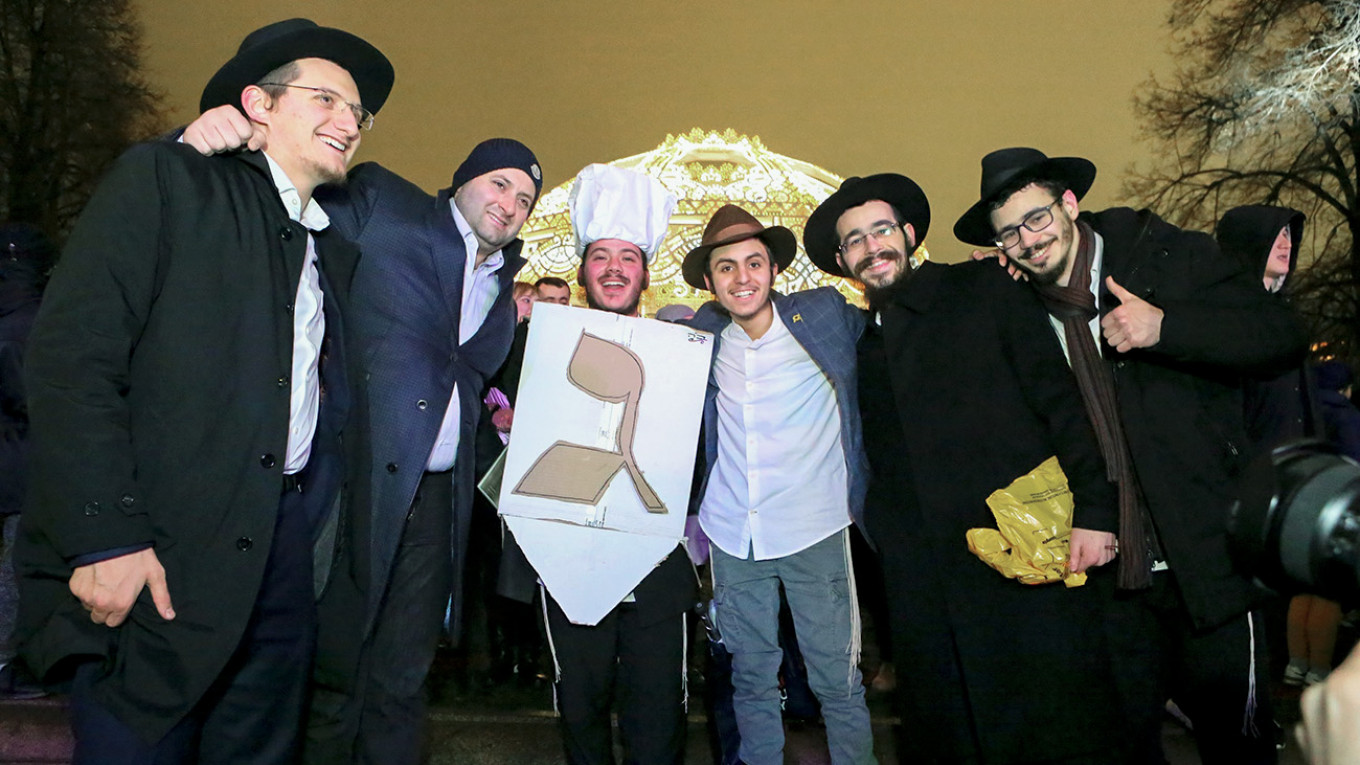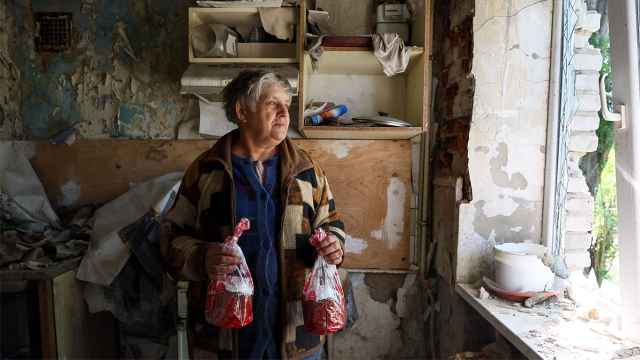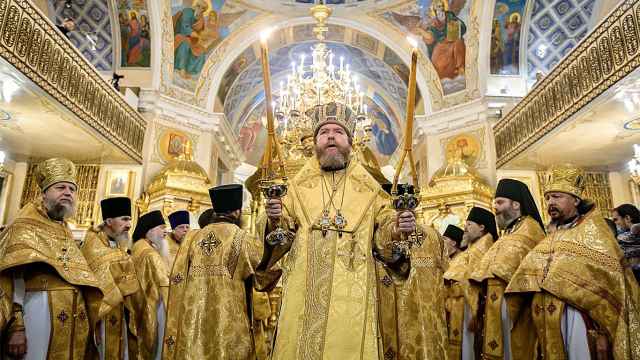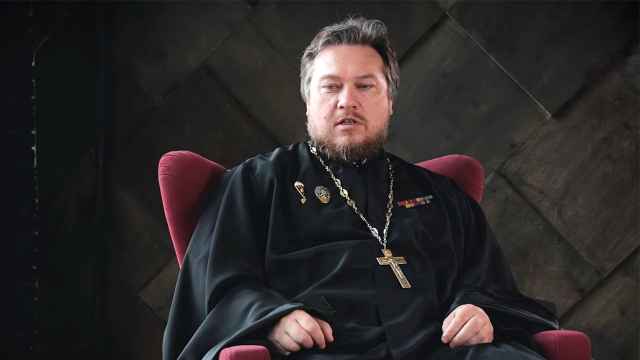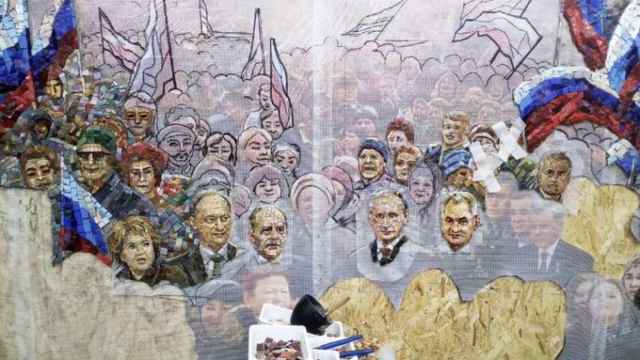Early Sunday evening, several hundred Jews gathered on Ploshchad Revolyutsii, a central square in Moscow, for the 30th straight year to celebrate the start of the eight-day Jewish holiday of Hanukkah. Behind the back of a large statue of Karl Marx — the godfather of the Soviet Union — revelers danced to traditional Jewish music and lit a ceremonial menorah.
Taking place just a stone’s throw from the Kremlin, which promoted a policy of state-sponsored anti-Semitism during the Soviet era, what has become a ritual nonetheless continues to surprise those who participate, given the country’s history.
“If you had told me 20 — even 10 — years ago that we would feel so comfortable celebrating our faith so openly in the center of Moscow, I would have never believed you,” said Larisa Rempel, 70, whose sister-in-law was among the thousands of Russian Jews to emigrate for countries that welcomed the Jewish faith.
This year, however, there has been much to discomfort Hanukkah celebrations, which came at a time of heightened anti-Semitism around the world.
Earlier this month, two gunmen attacked a Jewish market in Jersey City, New Jersey, killing six people. In France, anti-Jewish offences are up 74 percent this year from 2018, while in London, authorities counted three anti-Semitic offences on the Underground — the city’s metro — in a single week last month. Not to be outdone, New York this week saw four anti-Semitic attacks over a 24-hour period.
“This all does give you second thoughts,” said Rabbi Yaakov Klein, who was born in Brooklyn, New York and moved to Moscow 13 years ago, where he heads the International Jewish Community of Moscow and helped organize the celebrations.
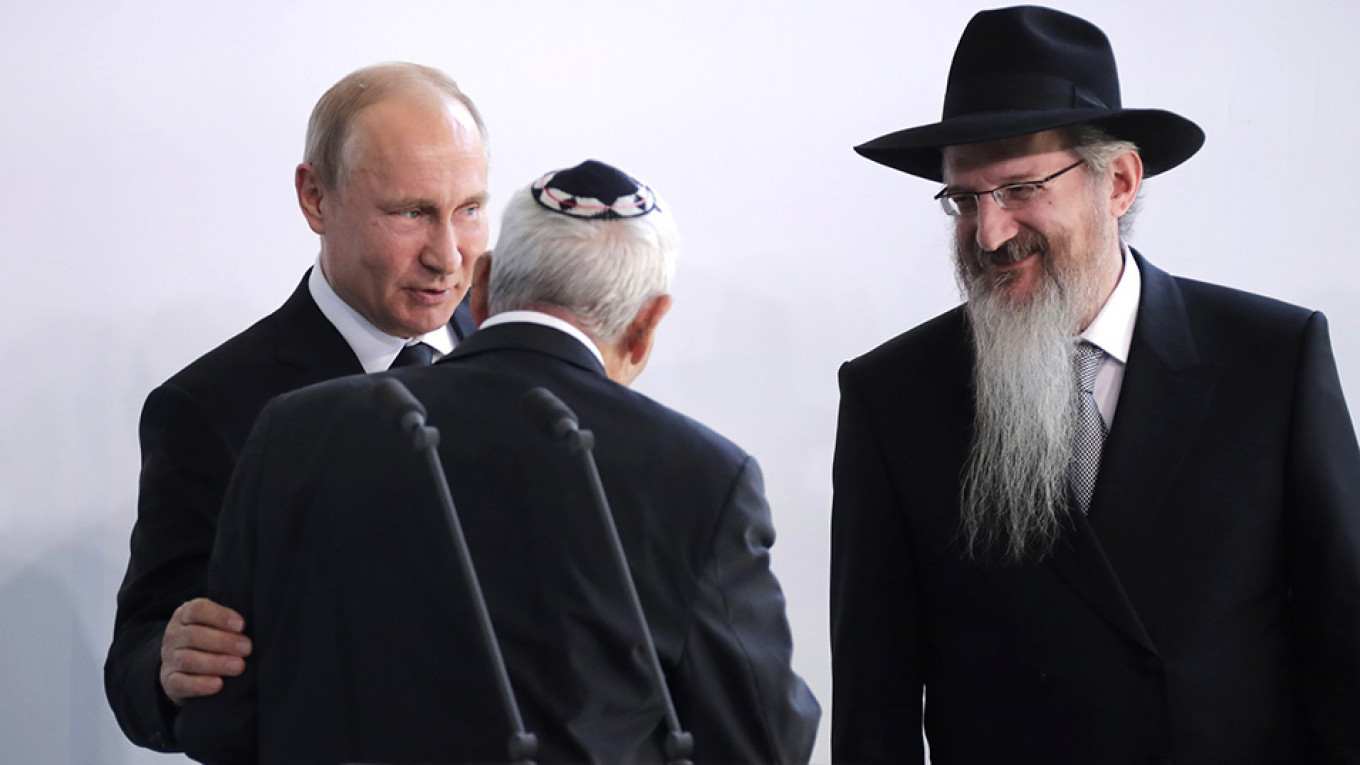
Despite the fears, the celebrations went on this year nonetheless. Klein, whose mother moved to New York from Moscow after World War II, credits this to a period of relative comfort for Jewish people in Russia.
“Considering the history of this country, which hasn’t really been good to Jews, this is probably the best time for Jews in Russia’s history,” he said.
Addressing the gathered crowd, Russia’s chief rabbi Berel Lazar, an ally of President Vladimir Putin, named the president as the reason this is the case. His words were greeted with applause.
“Today in Russia there is a respect of traditional values,” Lazar told The Moscow Times in an interview on the sidelines of the event. “What we see in Europe and the United States is a consequence of liberalism — there are no values, no morals.”
“The president of a country has to show what’s important — then people will get the right signals,” the rabbi added.
Putin, who regularly speaks out against anti-Semitism, has long fashioned himself as a backer of Russia’s Jewish community. In 2012, for instance, oligarchs close to him funded the building of a $50 million Jewish Museum and Tolerance Center, with the president himself donating a month’s salary to the cause.
In recent years, anti-Semitic attacks in Russia have been sparse.
Over the past three years, the Moscow-based SOVA Center, which tracks extremism, has only counted one identity-driven assault against a Jewish person in Russia, its director Alexander Verkhovsky said. Meanwhile, attacks on material objects — schools, synagogues, cemeteries — amount to about four or five annually. That is compared to 35 in 2008 and 15 in 2010.
Verkhovsky, however, noted that the center does not track hate speech, explaining that that would be too difficult to tally up.
Others point to tight security measures in Russia — where synagogues are often guarded and revelers were searched by Moscow police to enter the square where the Hanukkah celebrations were held this week — as the reason behind a dearth of anti-Semitic attacks.
“I know there’s still anti-Semitism, of course, so it makes my being in a synagogue and practicing Jewish life a lot more comfortable,” explained Bella Goldsteyn.
Goldsteyn, 28, moved to Washington D.C. from Moscow last January on a fellowship program just weeks after an attack on the Tree of Life synagogue in Pittsburgh, Pennsylvania left 11 dead and six wounded. At that point, Chabad Washington D.C., where Goldsteyn celebrates Jewish holidays, had not implemented any precautionary safety measures, she said.
“I remember noticing the difference with how we protect synagogues in Russia and I was wondering why there weren’t any metal detectors,” she said.
Kayla Goldstein, 24, grew up attending Tree of Life in Pittsburgh and now lives and practices Judaism in Moscow. Knowing the victims personally has led her to reconsider whether Jewish halls of prayer should be so open to the public.
But she also recalled how when two American friends — one female, one male — visited Moscow, a security guard outside of the synagogue she attends would not let in her male friend, having first asked him to prove that he was Jewish.
“On the one hand, the security guard was there to protect us,” Goldstein said. “On the other hand, this exclusion can be a blockade to the faith, which is supposed to be open to all.”
“It’s all left me very confused,” she added. “Should some people be profiled? Then again, we’ve seen that there is a point to where you can be welcoming but also need to stay safe.”
A Message from The Moscow Times:
Dear readers,
We are facing unprecedented challenges. Russia's Prosecutor General's Office has designated The Moscow Times as an "undesirable" organization, criminalizing our work and putting our staff at risk of prosecution. This follows our earlier unjust labeling as a "foreign agent."
These actions are direct attempts to silence independent journalism in Russia. The authorities claim our work "discredits the decisions of the Russian leadership." We see things differently: we strive to provide accurate, unbiased reporting on Russia.
We, the journalists of The Moscow Times, refuse to be silenced. But to continue our work, we need your help.
Your support, no matter how small, makes a world of difference. If you can, please support us monthly starting from just $2. It's quick to set up, and every contribution makes a significant impact.
By supporting The Moscow Times, you're defending open, independent journalism in the face of repression. Thank you for standing with us.
Remind me later.



